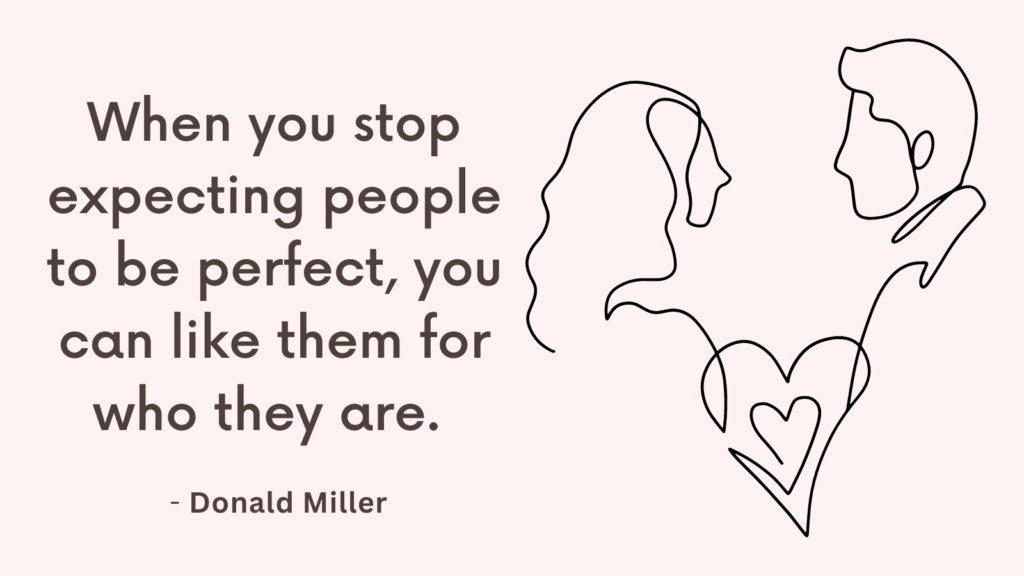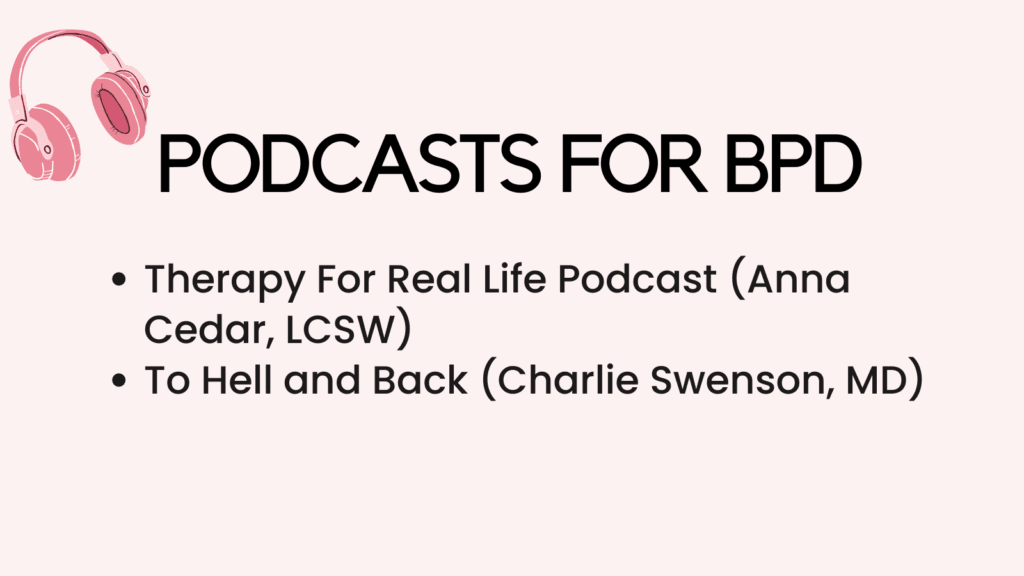In this post, you’re going to learn how to comfort someone with BPD.
How To Comfort Someone With BPD?
BPD is a complex mental health condition characterized by difficulties in regulating emotions, unstable self-image, and turbulent interpersonal relationships.
Supporting someone with BPD can be challenging, but with the right approach, you can offer comfort and create a safe space for them. Here are some suggestions to consider:
1. Educate yourself
Take the time to learn about BPD to gain a better understanding of the condition.
Familiarize yourself with the common symptoms, triggers, and challenges that individuals with BPD may face.
This knowledge will help you approach their experiences with empathy and reduce potential misconceptions.
Here are some common signs and symptoms associated with BPD:
- Intense and unstable emotions, including periods of extreme sadness, anger, or anxiety that may last for a few hours or even days.
- Fear of abandonment. This fear can lead to frantic efforts to avoid real or perceived abandonment, such as clinging to relationships or becoming overly dependent.
- Unstable self-image, making it difficult to establish a consistent identity, preferences, or life goals, which leads to feelings of emptiness or confusion about who they are.
- Impulsive and risky behaviors to alleviate emotional pain or fill a void, such as reckless driving, substance abuse, spending sprees, binge eating, or engaging in unsafe sexual practices.
- Unstable and intense relationships characterized by alternating between idealizing and devaluing others.
- Chronic feelings of emptiness, as if something is missing.
- Self-harming behaviors as a way to cope with overwhelming emotions or to seek attention and support from others.
- Dissociation, where individuals may feel disconnected from themselves or their surroundings.
Related: Top 7 Skills For Coping With BPD [+ BPD FREE Resources]
2. Show empathy and validate their feelings
Individuals with BPD often experience intense and fluctuating emotions.
It is crucial to acknowledge and validate their feelings without judgment.
Let them know that you accept their emotions as valid, even if you may not fully understand their intensity.
Here are a few validating statements to provide comfort and support for someone with BPD:
- “Your emotions are valid and real. It’s okay to feel intensely, and it doesn’t make you any less deserving of understanding and support.”
- “It takes a lot of strength to face the daily battles that come with BPD. Your resilience and determination are commendable.”
- “It’s alright to take time for self-care and prioritize your mental health. Your well-being matters, and it’s important to give yourself permission to focus on your needs.”
- “Remember that progress is not always linear. It’s normal to have ups and downs on your journey towards healing. Each step forward, no matter how small, is significant.”
- “You have unique strengths and qualities that make you who you are, regardless of your BPD diagnosis. Don’t let it define you or diminish your worth.”
Related: How To Validate Someone’s Feelings Without Agreeing? (+Examples of Validating Statements)
3. Practice active listening
Provide a safe and non-judgmental environment for them to express their thoughts and emotions openly.
Engage in active listening by giving your full attention, maintaining eye contact, and using gestures or verbal cues to demonstrate your presence and understanding.
Reflect back what you hear to show that you comprehend their experiences.
Related: Saying No To Someone With Borderline Personality Disorder
4. Offer consistent support
Individuals with BPD may fear abandonment or rejection, so it is essential to provide consistent support.
Be available and reliable, while also maintaining healthy boundaries.
Consistency can help build trust and provide a sense of security, which can be especially valuable to someone with BPD.
5. Be patient and understanding
Recovery and progress for individuals with BPD take time.
It is essential to be patient and understanding, as setbacks or challenges may occur along the way.
Celebrate small victories and remember that healing is a journey.
Related: Best 20 Tips On Dating Someone With BPD Without Becoming A Caretaker
6. Avoid taking things personally
Due to their emotional challenges, individuals with BPD may occasionally display intense or seemingly irrational reactions.
Remember that these reactions are not about you personally.
Try not to take their words or behaviors personally and remind yourself that they stem from their internal struggles rather than any fault of your own.

What Are BPD Triggers?
BPD triggers are specific events, situations, or interactions that can provoke intense emotional reactions and exacerbate the symptoms of Borderline Personality Disorder (BPD).
These triggers can vary from person to person, as everyone’s experiences and sensitivities differ. Understanding BPD triggers is crucial in managing the disorder effectively.
1. Abandonment
Individuals with BPD often have an intense fear of abandonment.
Any perceived threat of being left alone or rejected can trigger feelings of anxiety, anger, or despair.
This might happen in relationships, friendships, or even when someone cancels plans unexpectedly.
2. Rejection
BPD individuals may be highly sensitive to rejection or criticism.
Even minor feedback or perceived slights can trigger intense emotional reactions like anger, sadness, or feeling devalued.
This hypersensitivity to rejection can impact various aspects of life, including work, social interactions, and personal relationships.
Related: How to Love Someone with BPD? Top 9 Suggestions
3. Loss or Separation
Experiencing the loss of a loved one or separation from a significant relationship can be extremely distressing for individuals with BPD.
These events can elicit overwhelming emotions, leading to feelings of grief, emptiness, or depression.
4. Betrayal
Trust issues are common among individuals with BPD due to past traumatic experiences or unstable relationships.
Any form of perceived betrayal, such as lies, dishonesty, or infidelity, can be a strong trigger for intense emotional reactions like anger, feelings of betrayal, or even revenge fantasies.
5. Criticism or Failure
BPD individuals often set high expectations for themselves and fear failure.
Harsh criticism or not meeting their own standards can trigger intense self-criticism, feelings of worthlessness, and a fear of being inadequate or imperfect.
Related: Top 10 BPD Books To Help You Cope With Borderline Personality Disorder
6. Conflict or Arguments
Engaging in conflicts or arguments can be particularly challenging for individuals with BPD.
The fear of rejection, abandonment, or being misunderstood during conflicts can trigger intense emotional dysregulation, leading to impulsive behaviors, anger outbursts, or self-harming tendencies.
7. Feeling Neglected or Ignored
Ignoring or neglecting the needs of someone with BPD can be a significant trigger.
They may interpret these actions as rejection or as confirmation that they are unimportant, which can lead to feelings of intense sadness, anger, or frustration.
Related: Borderline Personality Disorder (BPD) Resources (Information, APPS, Podcasts, TED Talks, Books)
8. Intense Emotional States
Extreme emotions themselves can serve as triggers for individuals with BPD.
When they experience intense anger, sadness, or anxiety, it can be overwhelming and difficult to manage.
These emotional states can sometimes escalate quickly, leading to impulsive actions or self-destructive behaviors.
9. Times of Change or Uncertainty
BPD individuals often struggle with adapting to change or facing uncertainty.
Major life transitions, such as moving, changing jobs, or starting a new relationship, can evoke anxiety and distress.
Uncertainty about the future can intensify fear and heighten emotional reactivity.
10. Triggering Environments
Certain environments can act as triggers for individuals with BPD.
For example, crowded places, loud noises, or chaotic situations may overwhelm their senses and lead to heightened emotional reactivity.
Additionally, being in environments that remind them of past traumatic experiences can also be triggering.
Conclusion
Remember, each person with BPD is unique, and what works for one individual may not work for another.
Adjust your approach based on the specific needs and preferences of the person you are supporting.
If you feel overwhelmed or unsure about how to provide the necessary support, consider consulting with a mental health professional who can offer guidance tailored to your specific situation.



![BPD Support Groups [Online & In-Person]](https://ineffableliving.com/wp-content/uploads/2022/09/Borderline-Personality-Disorder-Support-Group-1024x576.png)